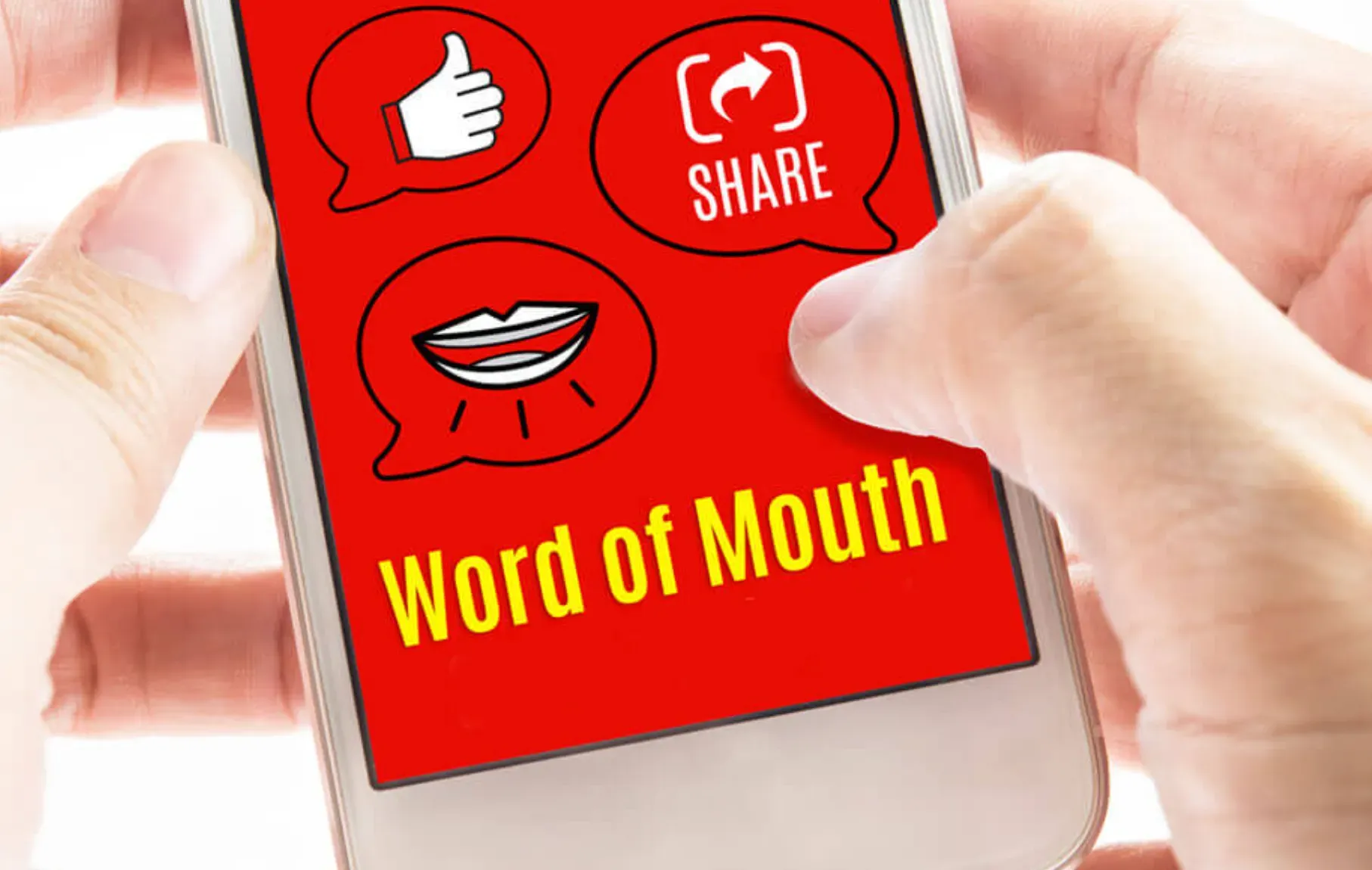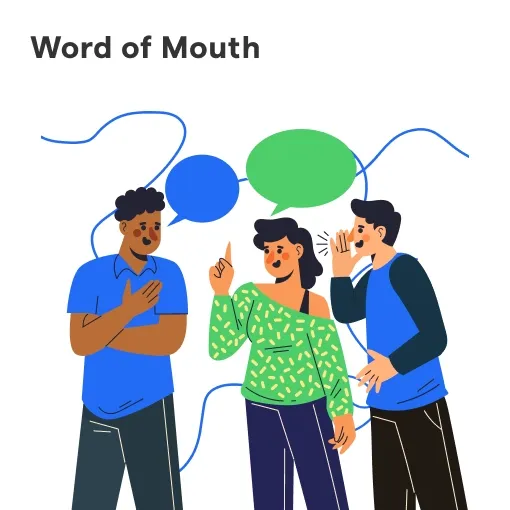What is Word of Mouth?
Word-of-mouth (WOM) refers to the informal communication about products, services, or companies among consumers. Unlike traditional advertising channels, WOM is largely organic and driven by customer experiences and perceptions.
Why is WOM Important?
Word-of-mouth marketing is highly influential because people tend to trust the opinions of their peers more than traditional advertising. WOM can impact everything from brand perception to customer loyalty and sales.
Different Types of WOM
Word-of-mouth can take several forms based on the communication medium and the source. This includes direct WOM (personal conversations), indirect WOM (online reviews, social media), organic WOM (unprompted), and amplified WOM (initiated by marketing activities).
The Power of WOM
WOM is a potent force because it travels through trusted social networks. Positive WOM can boost a brand's reputation and lead to exponential growth, while negative WOM can harm a brand's image significantly.
Harnessing Word of Mouth
Here we will discuss different tactics companies can employ to stimulate and leverage word-of-mouth.

Encouraging WOM
Companies can encourage WOM by delivering high-quality products, exceptional customer service, and experiences worth sharing. Unique branding and cool product features can also spur discussions among consumers.
Amplifying WOM through Marketing
Marketers amplify WOM through activities like referral programs, influencer collaborations, viral marketing campaigns, and social media engagement. They aim to trigger conversations that consumers will continue among themselves.
Monitoring WOM
Brand monitoring tools enable companies to track WOM concerning their brands. By listening to these conversations on different channels, companies can gain insights and manage their brand reputation effectively.
Using WOM for Improvement
Companies can learn from both positive and negative WOM. Feedback helps them understand their strengths, fix shortcomings, and make strategic decisions based on customer preferences and issues.
Effect of Word of Mouth
This section reveals how WOM can influence various aspects of a business.
Influence on Customer Behavior
WOM can significantly impact consumers' purchasing decisions. Potential customers are usually more persuaded by peers and existing customers than direct brand messages.
Influence on Sales and Revenue
Positive WOM can drive sales, as satisfied customers refer others to the brand. Negative WOM, on the other hand, can deter potential customers and reduce sales.
Influence on Brand Reputation
WOM can shape brand reputation. Brands associated with positive WOM enjoy higher trust and goodwill, while brands with negative WOM can experience reputational damage.
Influence on Market Trends
Powerful WOM can create or disrupt market trends. A product or service that generates tremendous WOM can turn into a trend that others in the industry follow.
Word of Mouth in the Digital Age
Here we delve into how WOM has adapted to fit the increasingly digital world we now live in.

Online WOM
Today, WOM often happens online. Websites, blogs, review platforms, social networking sites, and apps are common venues for sharing opinions, recommendations, and experiences.
Influence of Social Media on WOM
Social media exponentially amplifies WOM. Reviews, comments, likes, shares, and retweets spread WOM at an incredible pace across vast networks.
Role of Influencers
In the digital age, influencers often kick-start WOM. Their endorsement or criticism of a product or brand can sway millions of followers.
Managing WOM in the Age of Internet
It's crucial for brands to monitor and respond to online WOM using reputation management tools, building a positive online presence, and addressing negative comments promptly and professionally.
Word of Mouth Research
Research in WOM helps us understand its nature, dynamics, and effects in more depth.
Methods of Studying WOM
Many scientific methods like surveys, interviews, network analysis, text analysis, and experimental studies are used to study WOM.
Related Academic Fields
Academic fields such as Marketing, Consumer Behavior, Information Systems, and Sociology all contribute to the understanding of WOM.
Net Promoter Score (NPS)
Net Promoter Score is a common metric used to understand customers' likelihood of recommending a brand, reflecting the potential for positive WOM.
WOM Contagion
WOM Contagion studies how information, ideas, and behaviors spread through social networks, similar to how diseases spread in a population.
The Human Psychology Behind WOM
Understanding what drives people to share their opinions and experiences with others requires delving into elements of human psychology.

Role of Emotions
Emotionally charged experiences are more likely to be shared. Both positive (joy, excitement) and negative emotions (anger, disgust) can stimulate WOM.
Social Needs and WOM
Humans have innate social needs like being recognized, valued, and part of a group. Sharing valuable information or unique experiences fulfills these needs.
Cognitive Dissonance and WOM
Cognitive Dissonance Theory suggests that people are motivated to share their experiences to gain reassurance and reduce discomfort about their choices.
Trust and Social Proof
People rely on social proof, the behavior of others, to make decisions in uncertain situations. Trust in WOM sources significantly impacts its effect.
Frequently Asked Questions (FAQs)
How can you track the success of word of mouth marketing?
Tracking the success of word of mouth marketing can be challenging since it relies on organic recommendations. However, you can monitor online reviews, social media mentions, referral codes, and customer feedback to gauge its effectiveness.
How can you generate positive word of mouth?
To generate positive word of mouth, focus on delivering exceptional products or services. Encourage satisfied customers to leave online reviews and testimonials. Utilize social media platforms to share customer success stories and engage with your audience.
What are some common mistakes to avoid with word of mouth marketing?
Common mistakes to avoid include overpromising and underdelivering, neglecting customer feedback, and failing to address negative word of mouth. It's important to be responsive, transparent, and constantly strive to improve the customer experience.
How long does it take for word of mouth to have an impact?
Word of mouth can spread quickly, but its impact may vary. It depends on various factors such as the size of your target audience, the enthusiasm of your advocates, and the strength of your product or service. Generally, word of mouth can have an impact within days or weeks.
Can negative word of mouth harm your business?
Yes, negative word of mouth can significantly harm your business. People are more likely to share negative experiences, and it can spread quickly through social media platforms and online reviews. Addressing and resolving negative feedback promptly is crucial in managing your reputation.

